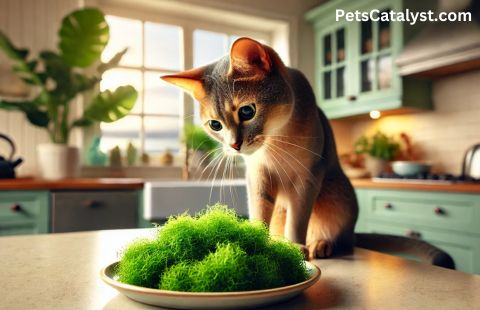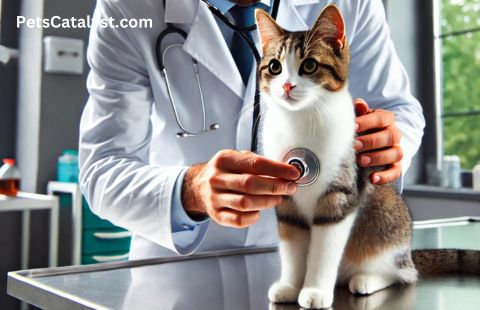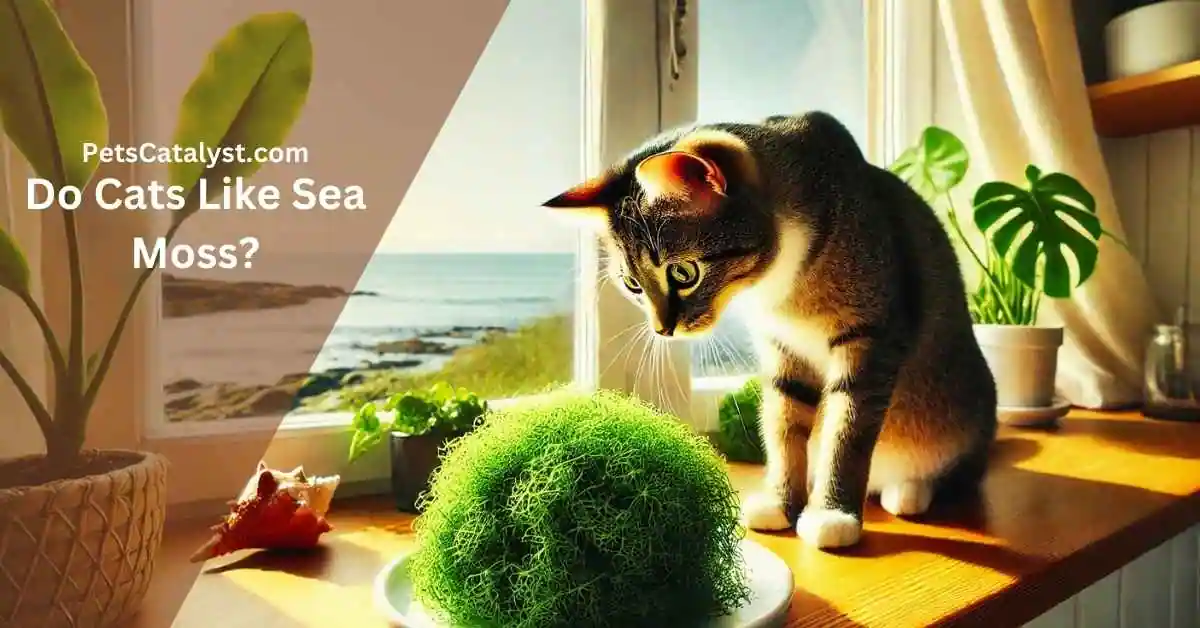Do cats like sea moss? That got me thinking — I consider myself a reasonably intelligent pet parent and also someone who has had many years of experience looking after my furry family members, so I was genuinely shocked that I even had to consider this recently when looking into natural pet supplements.
Though my cat Whiskers rolls her eyes and turns away with that almighty cat arrogance every time I experiment with something new, I have found some fascinating facts about cats and this superfood that everyone keeps talking about.
Seriously though, when I even mentioned sea moss around my cat, the expression that came to his face was akin to that of suggesting bath time – you know the one! But wait, here is the kicker: as my turtle chomps his way through fresh leafy greens and my dogs enjoy their own selection of healthful treats, cats can also form unique bonds with natural supplements.
What is Sea Moss?
But before jumping on to whether do cats like sea moss or not, let me first tell you the exact meaning of this ocean treasure. Remember when I take something new to the kitchen and my cat will come to check out? Sea moss definitely caught her attention though!
Sea moss, or its scientific name Chondrus crispus, is a type of red algae that grows abundantly along the rocky coasts of the Atlantic. Consider it as sea’s multivitamin! Ironically, when I first touched the sea moss, it felt like the toys my dogs play with which are soft and a bit squishy.
Sea moss is a natural health supplement trending with human health, and packs a serious nutritional punch. It contains many minerals such as iodine, potassium and magnesium. Now with over 8 years of experience caring for multiple pets, I can attest that, when used correctly, natural supplements can be a real game-changer.
Safety Concerns About Sea Moss for Cats
Is sea moss safe for cats?
Firstly, let’s tackle the important topic of safety – something we all want to know about as responsible pet parents! After taking care of many pets over the years — including my own too-curious cat — I’ve learned to read about food organizationally in their diet.
Video Credit: The Cat’s Meow
Although sea moss is not toxic to cats, it should be used with care. As with my turtle’s food, there are unique factors for cats; Now, no matter how tempting it may seem, never serve sea moss to your cat before consulting your veterinarian – I learned this the hard way after years of being a pet parent adventurer!
Everyone knows that every cat is different. What works for my own adventurous little kitty may not do for yours. Whenever in doubt, I always tell my readers, go consult your vet.
Can cats eat sea moss?
Short answer: yes, but this story is longer than that. Sea moss is safe for your cats in moderation, but they can live well without the supplement in bulk. Consider it something like those high-end cat treats – a little bit goes a long way!
If you are giving sea moss to your cat for the first time, then it will be best to start by including very tiny quantities into their normal food. I had learned this the hard way with my own cat — slow and steady indeed wins the race with new foods.
Sea moss toxicity for cats
Well, here is some good news: sea moss is not necessarily toxic to cats. But there is an important caveat:
- Use food-grade sea moss: As always, quality counts
- Look out for additives: Many processed sea moss products could have harmful Ingredients.
- Monitor for reactions: Just like my dogs have different tolerances to treats, cats can react differently.
How much sea moss can cats have?
Clean sea moss (high in quality) is not toxic to the cat’s. On the other hand, sea moss that is contaminated or misprocessed can be dangerous. Lessons I’ve learned to look out for:
- Get your material always from trustworthy suppliers.
- Look for synthetic additives
- Be cautious of possible iodine levels
- Monitor for symptoms of allergies
This is the kind of thing I would do with all of my pets whenever they are trying something new, and I would advise you to do it too so you really know how your cat will react.
You May Like to Read:
Benefits of Sea Moss for Cats
So why would anyone even want to add sea moss to a cat’s diet in the first place? Which brings me to the prospect of health benefits.
Here are a few of the health benefits of sea moss for cats:
- Thyroid health: The iodine content supports function and if given in moderation.
- Glossy Fur and Healthy Skin: Sea moss is rich in vitamins and omega-3 fatty acids that may provide a soft coat.
- Immunity: The antioxidants in sea moss may help to improve a cat’s immune system.
Is Sea Moss Safe for kittys? It could be, but just take to mind that it is not needed by our cat friends. Most of their necessary nutrients are already in their diet. Sea moss could be an added bonus for your cat, but do not rely on it.
So does sea moss boost cats immunity or provide beneficial fiber? Some people have anecdotal claims that the minerals and fiber may help with digestion or that they may help improve immunity. However, that does not mean that sea moss works miracles.
Note: There is not enough research on sea moss in cats, and cat supplements should always be vet-approved.
Possible Side Effects or Risks of Sea Moss
And this is something very important about sea moss, so please listen, I stumbled on this when I was researching supplements for my pets. Like my cat who once had a tummy distress due to a new treat, sea moss may have a few unwanted effects to note.
The main worry is with iodine levels — excess iodine can disrupt the functioning of your cat’s thyroid. And after having to keep an eye on four different pets’ health, take it from me, you don’t want to mess with thyroid issues! Excessive sea moss can also cause a cat to have an upset stomach with digestive issues like diarrhea or vomiting.
Despite this, here’s what I watch out for with my cat:
- Excessive thirst
- Changes in appetite
- Unusual lethargy
- Digestive issues
- Possibility of allergic reactions (although less)
Keep in mind that what worked for my adventurous kitty may not work for yours. Begin with small doses and observe for any response. My rule of thumb though is to ALWAYS run it by your vet first, if in doubt!
How to Feed Sea Moss to Cats
I have been slipping supplements to my pets (yes, I have even tricked my crazy picky cat!), So, here’s a method that has worked for us when we tried introducing sea moss to our cat.

Begin with clean, quality sea moss gel (I make mine fresh). Those are things that your cat will be able to sniff out from a mile away, believe me! Add a small amount (like pea sized) in with their usual wet food. A little trick I picked up from giving medications to my cat; put it with their favorite food and it usually works!
Here’s my simple strategy:
- Start with a minimal amount
- Mix thoroughly with wet food
- Never serve it plain
- Stick to once-daily feeding
- Watch their reaction
You know how my cat gives me the STAAARE squinty eye when I first try to feed him new food? That’s normal! Do take your time and stand your ground but do not push it. If they’re not interested, that’s totally fine too!
Comparing Sea Moss to Other Supplements
| Supplement | Benefits for Cats | Potential Drawbacks | Best Used For |
|---|---|---|---|
| Sea Moss | Contains iodine, omega-3, vitamins; supports thyroid and skin health | Risk of iodine overload, potential contaminants | Occasional immune or coat support |
| Fish Oil | Rich in omega-3 fatty acids; promotes healthy coat, joints, and heart | Can upset stomach if given in excess | Daily supplement for coat and joint health |
| Taurine Supplements | Essential amino acid; critical for heart and vision health | Over-supplementation usually unnecessary | Cats with known taurine deficiencies |
| Probiotics | Aids in digestion, boosts gut health and immunity | Some cats may not tolerate certain strains | Digestive issues, after antibiotics |
| Spirulina | High in protein and vitamins; boosts energy and immune system | Risk of contamination, not all cats like the taste | Energy and immune support |
| Bone Broth | Rich in collagen, promotes hydration and joint health | Can be high in sodium if not homemade | Encouraging hydration, joint health |
Veterinary Opinions and Guidelines
You May Be Interested in: What The Experts Are Saying
What vets say about sea moss for cats: Most vets seem to think it’s a good thing, but not a necessity. Cats will mostly obtain their nutrients from well-balanced premium cat food.

Supplements designed specifically for cats and approved by veterinarians are a better choice. If your feline friend could use a few wider nutritional sails, your vet can suggest something tried-and-true.
The takeaway from this: Trust your vet — not what the internet says. Our kitties are too precious, and their health is not worth sacrificing to try to keep up with a fad.
FAQs About Sea Moss and Cats
Q: Do cats need sea moss in their diet?
A: No, sea moss is not required for cats. A properly balanced cat diet contains just the nutrients they need.
Q: Is sea moss good for my cat’s coat?
A: Perhaps, but fish oil or other safe pet supplements are typically more effective.
Q: What If my cat eats sea moss a lot by mistake?
A: Watch for signs of vomiting or lethargy. If anything seems amiss, then get your vet involved.
As someone who has lived with several — some picky — cats, I know the significance of choosing wisely when it comes to the nutrition of your pets. Sea moss is safe to give your cat on occasion, but it’s not a magic pill.
Make sure you always incorporate your cat’s regular diet and check with your vet prior to trying anything new. As with my pets (who each have their own tendencies and needs), what works for one kitty may not work for another.
As always, consult your veterinarian before introducing a new supplement into your cat’s diet. Disclaimer: This article is written from personal experience and research and is not a replacement for professional veterinary advice.
Follow Us: Facebook | X (previously Twitter)










